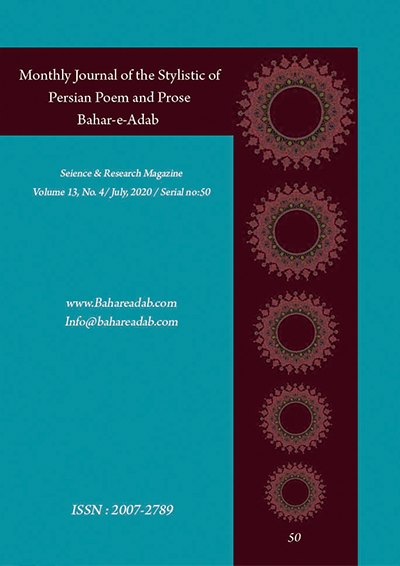- Count View : 556
- آدرس کوتاه شده مقاله: https://bahareadab.com/article_id/364
Journal of the stylistic of Persian poem and prose
volume Number 13،
number In Volume 4،
،
issue Number 50
The effect of Dehkhoda on satire style Reza Ganjei
Mohammad Keshavarz , Farhad Doroudgarian (Author in Charge), Behnaz Alipour Gaskari , Ali Pedram Mirzaei
Abstract
One of the pioneers of contemporary Iranian satire is the style writer Ali Akbord Khodha, who has always been seen as a satirist by many of his comic strips. Reza Ganjeei, founder of Babashmal Magazine is one of the lesser known and successful Iranian satirists whose style of writing is heavily influenced by Dehkhoda"s satirical style. The subject of this paper is a comparative study of Dehkhoda and Ganji"s humorous style through the comparison of two "nonsense" and "heartache" humor columns in the four axes of linguistic, structural, humorous, and thematic questions to answer this question. To what extent has Ganjee been influenced by the style of God in writing his humorous articles? By comparing a number of articles by these two authors, it was concluded that the closet and Dehkhoda styles were characterized by linguistic features (especially simple and folk-language proverbs), structural features, humorous techniques (especially reversal, introduction). Innovative and ...) and in terms of the content of the works, they are remarkably similar. There are, of course, differences in each of these areas, especially in terms of narrative structure and some of the satirical techniques, in the writings of the two authors.
Keyword
Charand o Parand
, Babashamal
, Dehkhoda
, Reza Ganjeei
, Press Satire
- Arianpour, Yahya (2003), From Saba to Nima, Tehran: Zavar
- Yevgeny Yevich, Andre (1996), History of Persian Literature, translated by Sirus Izadi, Tehran: Helmand
- Javadi, Hassan (2005), History of Humor in Persian Literature, Tehran: Caravan
- Soleimani, Mohsen (2012), Secrets and tools of satire, Tehran: Surah Mehr
- Afshar, M. (2008), Humorous similes, Journal of Persian Language and Literature, Volume 22, Number 1, Page 47
- Dehkhoda, Ali Akbar (2009), Charand and Parand, Tehran: Ham mihan
- Saberi, K (1371), Khadem al-Faqra: Dakho Alisha, Gol Agha Yearbook, second year, p. 34
- Enayat, Mahmoud (2003), Dehkhoda and Political Humor, Tehran: Qatreh
- Payende, Abolghasem (1999), Dehkhoda satirist, by Valiollah Droudian, Tehran: Gol Agha
- Dehkhoda, Ali Akbar (1991), Dehkhoda's Divan, by Koushshid Birsiaghi, Tehran: Tirazhe
- Mojtahedi, Mehdi (2002), Political Men of Azerbaijan in the Constitutional Era, Tehran: Zarrin
- Salahi, Imran (2016), Humor in Straw Paper, Tehran: Morvarid
- Najafzadeh Barforosh, Mohammad Baqer and Farajian, Morteza (1991), Iranian satirists and satirists from the Constitution to the Revolution, Tehran: Bonyad Publisher
- Homayi, Jalaluddin (1995), Rhetoric Techniques and Literary Crafts, Tehran: Homa
- Nabavi, Ebrahim (2005), Exploring Iranian Humor, Tehran:jamea iraniyan
- Ahmadi, I (2012), Comparison and analysis of the structure of Mollansereddin and Surasrafil newspapers, Journal of Persian Language and Literature, Faculty of Persian Literature, University of Tabriz, Volume 65, Number 225, p. 18
- Al-Ahmad, J (1337), Bankruptcy of the Press, Journal of Science and Life, No. 3, p. 79

